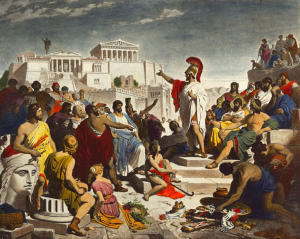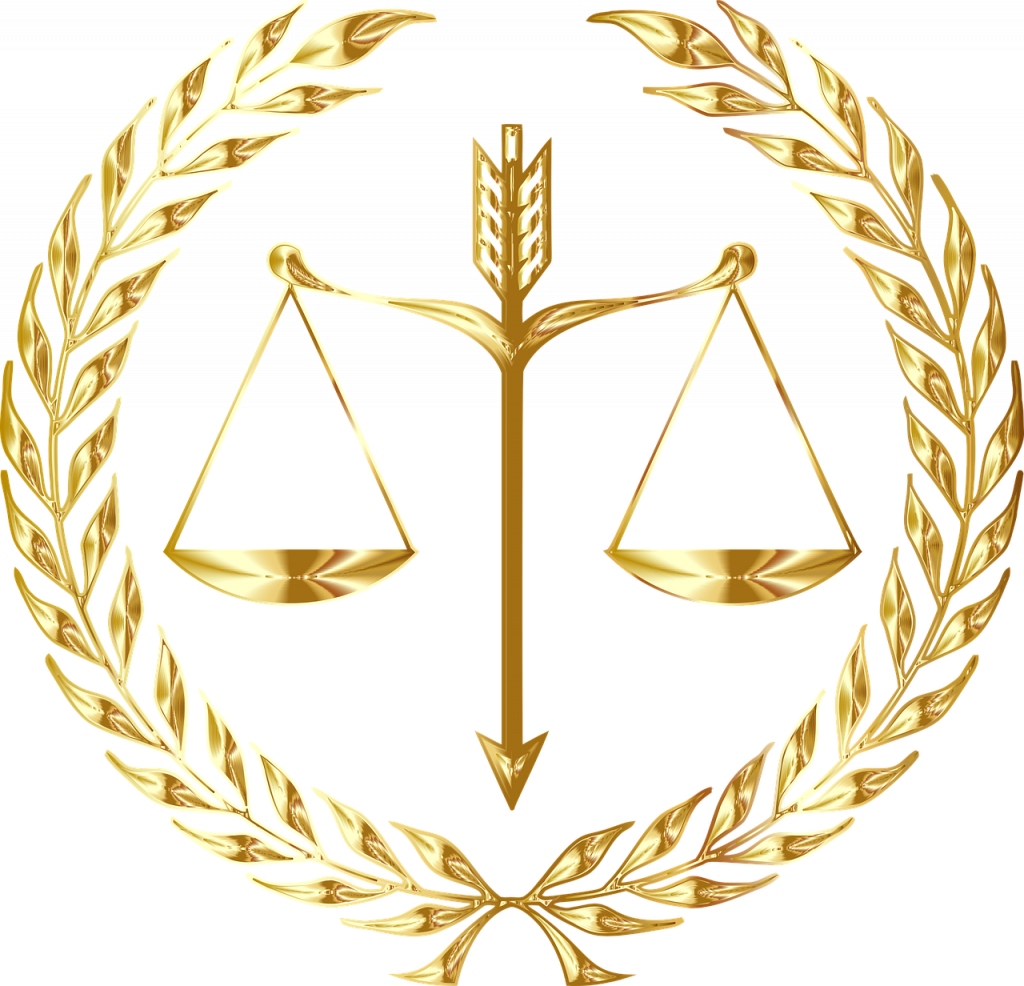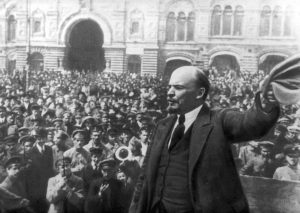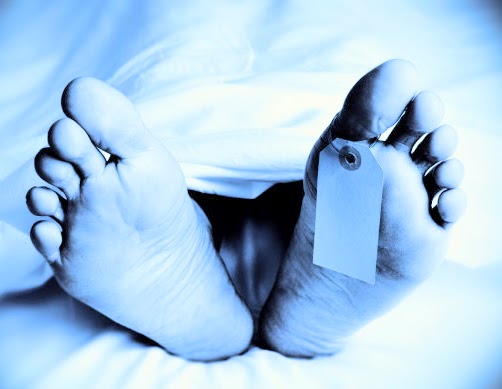Generally speaking, a watershed between the right and the left in politics is formed by the Enlightenment.
People I’d describe as real conservatives detest it, while those on the left feel exactly the opposite.
However, they both mysteriously agree about one Enlightenment offshoot: democracy of universal suffrage, one vote for every man, woman and increasingly child.
Democracy has been perched atop the political totem pole and, like all idols, stands above not only criticism but indeed serious analysis.
It’s regarded as the defining characteristic of today’s West, usurping Christianity in that role.
Democracy has become synonymous with liberty, justice, prosperity and all good things in life.
It’s widely perceived as the only possible alternative to despotism. None other can ever exist or indeed has ever existed.
This is a fallacy on many levels: historical, philosophical, logical or empirically demonstrable.
A few facts.
According to Freedom House, the Washington-based think tank, in 2007 the world could boast 123 electoral democracies – up from 40 in 1972 and from zero in 1900.
Thus, say, Victorian England wasn’t a democracy, and was therefore more despotic than today’s Columbia or Russia, which are.
Democracy, as defined today, then is barely 100 years old.
According to Tocqueville, who in the 1830s explained to Americans what their country was all about, democracy was the unique property of the United States from the word go.
Yet America’s Founders hardly ever spoke of it, at least not in the positive sense. For example, Thomas Jefferson, not widely perceived as an enemy of democracy, once echoed Plato by observing that, “A democracy is nothing more than mob rule, where fifty-one per cent of the people may take away the rights of the other forty-nine.”
The word gained some currency only towards the end of the 19th century, when America began to pursue imperial objectives outside the Western Hemisphere.
Yet Lord Acton wrote at roughly the same time that the main conflict during the French Revolution was “a great struggle between democracy and liberty,” thus suggesting that the two terms so often uttered in the same breath just might be mutually exclusive.
Even during the First World War President Wilson utterly befuddled all combatants by defining the objective of the conflict as “making the world free for democracy”.
The 20th century is thus the first in which democracy became accepted as a sine qua non of political virtue.
Yet we have to acknowledge ruefully that the balance sheet of what the publisher Henry Luce called the American century isn’t unambiguously glorious.
More people were killed in that century than in all other centuries of recorded history combined. Not all the carnage can be ascribed to sophisticated weaponry: tens of millions were dispatched by such expedients as executions, concentration camps, artificial famines, neglect.
As to liberty, defined as freedom from arbitrary restraints imposed by the state, one can’t help noticing that in most Western countries democracy is remiss on this score, while also going back on its etymological promise, the rule of the people.
In fact today’s democratic governments have more power over the individual than the most absolute of past monarchs.
I can’t think of any Western prince who extracted half or more of his subjects’ income, something seen as the unchallenged privilege of today’s prime ministers and presidents.
Nor can I think of any English king who, even had he wanted to, would have been allowed to toss away his realm’s sovereignty, something that democratic Tory administrations have been able to do with blithe ease.
While each great document of English political history reduced the power of the state vis-à-vis the people, today’s laws invariably do exactly the opposite.
Modern governments preserve the sham of pluralism, but in fact theirs is the rule by simulacrum – something that looks like popular rule but in fact isn’t.
The electorate effectively transfers dictatorial powers to its representatives, who are then free to act as autocratically as few real autocrats ever did.
The rule by simulacrum is such that all along the people are given an illusion of power by letting them choose their representatives. But that would be meaningful only if real choice existed.
In fact, there is next to none. The people are typically asked to choose which social democratic party within a homogeneous political elite they’d rather have to lord it over them.
Moreover, if we look at the leaders of any Western country, including ours, it’s hard to insist that democracy unfailingly elevates to government those fit to govern.
In much of the West, democracy has become self-perpetuating spivocracy, with the ruling party empowered to treat the support of a third of the electorate as a mandate to perpetrate constitutional vandalism, best exemplified in this country by Tony Blair’s tenure.
Meanwhile, the purveyors of democracy, of whom the neocons, both American and ours, take pride of place, not only refuse even to consider other options internally, but insist that unchecked democracy is a panacea for every country, regardless of its history, religion, traditions or current situation.
The year after the ‘collapse’ of the Soviet Union in 1991 Francis Fukuyama, then a neocon, triumphantly declared that history had ended, meaning that liberal democracy had vanquished, and no further debate was possible.
Well, history has restarted since then, as it did after Hegel made a similar claim following Napoleon’s victory in the 1806 Battle of Jena – as it always does.
Fukuyama merely communicated the only view acceptable in polite society. That is, democracy may have a few drawbacks, but they all spring from repairable mechanical glitches. None of them is attributable to its very nature.
This is a convention I find difficult to accept. I think that democracy is inherently much closer to tyranny than people give it credit for.
Now, the politics of a country or, even broader, a civilisation is always built on a metaphysical foundation.
Man’s way of organising political affairs is a reflection of man’s view of himself.
Thus Aristotle wrote “Man is by nature a political animal”. On the other hand, two thousand-odd years later Dr Johnson disagreed: “Public affairs,” he said, “vex no man”.
Despite expressing diametrically opposite views, they were both right. They simply spoke of different men. Aristotle commented on the man of his time, the pagan Greek, while Samuel Johnson commented on the man of his time, the Christian Westerner.
What we observe now is man taking a backward jump, leapfrogging Johnson’s time and landing smack in the middle of Aristotle’s.
Man once again is supposed to be the political animal of Hellenic antiquity, except that neither a Plato nor a Praxiteles nor a Sophocles is anywhere in evidence. Nor, more to the point, is a Pericles.
Democracy naturally promotes uniformity, and even in its earliest incarnation it distrusted those stuck out. Democracy killed Socrates for daring to be different; his disciple Plato narrowly escaped the same fate; and Plato’s disciples Alcibiades and Aristotle had to flee Athens one step ahead of the hemlock cup.
No wonder Plato regarded democracy as mob rule, and Aristotle described it as ‘a deviant constitution’. “Democracy,” he wrote, “arose from men’s thinking that if they are equal in any respect, they are equal absolutely.”
Significantly, both thinkers warned about the dangers of any method of government, be it democracy or monarchy, if it’s unbalanced by other methods. This understanding, later reinforced by just about every serious political thinker from Machiavelli to Montesquieu to Burke, greatly affected the English constitution.
The Greeks didn’t see the individual as having a sovereign value independent of the good of the polis.
Plato described this pecking order with helpful honesty and unmatched mastery in his Republic and especially in Laws. The polis was everything; the individual qua individual, next to nothing.
The same went for that extension of the individual, his family, which was to be reduced to more or less the state’s breeding farm.
In both Greece and Rome people were encouraged to float from one marriage to the next, or one liaison to the next, with no distinction made between children born in or out of wedlock.
Feeble babies were often killed in Sparta, Romans left unwanted baby girls by the roadside to be devoured by wild animals. Because the state had no use for them, they were useless in every sense.
This is the first intimation in history of the relationship since then amply proved: democracy and family are at odds.
They are not friends, nor even allies, but competitors: the stronger the one, the weaker the other.
Sensing this, John Locke, who laid out the groundwork for the liberal democratic state, countenanced not only divorce but even polygamy: “He that is already married,” he wrote, “may marry another woman with his left hand…”
It’s reassuring to observe how our Lockean modernity is following his ideas – if in Locke’s time hostility to marriage was still inchoate, by now it has grown to full maturity.
Christianity corrected pagan misconceptions by privatising the spirit and internalising man. Human beings were no longer valued just because of their achievements, birth or wealth, but simply because they were indeed human.
In their free time men no longer rushed out to the agora to express themselves. More and more they stayed at home to ponder God, pray to him and raise their children in the right spirit.
Family became the core institution of society, and politics began to reflect that.
Individuals began to be protected from the state by a thick gasket of local familial institutions: parish, village commune, township, guild, assembly of elders.
In time those institutions assumed the role of the formulator, educator and custodian of the social and moral order.
It was such institutions that gave physical shape to the three pillars on which, according to Burke, government should rest: prejudice, which is intuitive knowledge; prescription, which is truth passed on by previous generations; and presumption, which is inference from the common experience of mankind.
The power of the traditional, what I call organic, state would weaken as it moved from centre to periphery. It tended to devolve to the lowest sensible level, and localism at least held its own against centralism.
It was mostly local government and its magistrates who, along with the church, were responsible for regulating society.
The underlying assumption was that man was fallen and therefore fallible. Hence each community felt it was incumbent upon it to enforce standards of behaviour based on custom, experience and God’s commandments.
Local institutions also limited the power of the next tier up, which in turn also applied restraints to the power above itself, all the way up to the royal palace.
It was during the Middle Ages that most political institutions of modernity originated.
Tracing them back step by step, we’ll arrive at their ultimate provenance in the Christian doctrine of the autonomous individual, which is the only proven premise for individual freedom.
While early Christians didn’t use the term ‘human rights’, they wouldn’t have been unduly bothered had an intrepid stranger mentioned it to them, provided he could explain what he meant.
By contrast, Plato or Aristotle would have thought the stranger not so much intrepid as mad. People to them had rights as citizens, not as mere human beings.
As it was from barons’ councils that our modern parliaments have evolved, the post-Hellenic system of representation has ancient roots as well.
The same can be said about adjudication and property protection, whose historical precedence goes back to the Old Testament but whose political embodiment was mediaeval.
Above all, during the Middle Ages the individual could feel relatively secure behind the wall of intermediate, familial institutions I mentioned earlier. There were guarantors of liberty.
The transition from Hellenic antiquity to Christendom was precipitated by a radical shift in the understanding of the nature of man, and so was the transition from Christendom to the post-Enlightenment modernity.
This shift was largely animated by a revolt not only against Christianity as a religion but against the civilisation produced by Christianity, along with its every aspect – including politics.
The new, secular concept of man had no place for original sin. Rather than being sinful and therefore in need of guidance and, if need be, restraint, man was deemed to be perfect to begin with, and furthermore tautologically perfectible.
Some men demonstrably didn’t end up perfect, but only because they were corrupted by civilisation, specifically by Christendom.
Hence people were eminently qualified to govern themselves by the expedient of electing the worthiest among them.
Only that way could they overthrow the tyranny of kings, aristocrats and priests.
That was the pudding, and the proof was provided by three revolutions, English in the 17th century, American and French in the 18th.
In each case a small group of revolutionaries acting in the name of ‘the people’ incited a revolt against presumed tyrants acting in the name of God.
In all three instances the people found themselves under the yoke of much worse tyrannies than those replaced by the revolutions.
Of the three, it’s the American and the French revolutions that are particularly interesting, since their startling similarity was, and still is, largely misunderstood.
Even one of history’s greatest political minds Edmund Burke, while brilliantly tearing the French revolution to shreds in his Reflections, was well disposed towards the American one. ‘A revolution not made, but prevented,’ wrote the great Whig.
Yet the contemporaneous Tories begged to differ.
William Pitt the Younger referred to the American Revolution as “most accursed, wicked, barbarous, cruel, unnatural, unjust and diabolical.”
And Dr Johnson quipped: “How is it that we hear the loudest yelps for liberty among the drivers of negroes?”
Thirty years later, America’s second president John Adams rued, “I once thought our Constitution was a quasi or mixed government, but they had made it… a democracy.”
And, with laudable hindsight another five years later, “Did not the American Revolution produce the French Revolution? And did not the French Revolution produce all the calamities and desolation of the human race and the whole globe ever since?”
Both French and American revolutionaries, driven by the same Enlightenment ideas, rose against the least tyrannical kings one could imagine, Louis XVI and George III respectively.
While the beastliness of the French revolution is now widely accepted, the American one is wrongly believed to be fundamentally different. It really wasn’t.
In common with all modern revolutions American philosophes purporting to act in the name of the people falsified facts to justify their claims.
For example, repeating Locke’s fallacy of representation being the only legitimising factor of taxation, they decried taxation without representation and hence demanded their liberation from England.
Yet in England proper the taxes were higher than in America, and most English subjects weren’t represented either. Specifically taxes on tea, which led to the Boston Tea Party, were twice as high in England.
Once Americans were properly represented, their taxes predictably skyrocketed.
The American revolution also adumbrated criminalising not just political deed but also word – and even thought.
Those expressing the mildest sympathy for British rule, or even merely suspected of being likely to harbour such feelings, were routinely attacked both by the new-fangled law and the extra-judicial mob.
The law hit suspected infidels with confiscation, fines, imprisonment, deportation from any area threatened by a British advance, confinement to internment camps.
The mob would attack, rob and torture suspected Tories by tarring and feathering. The infidels would be made to recant publicly and forced, often at gun point, to take an oath of allegiance to the new republic.
Even the number of victims of both American and French upheavals is similar if we justifiably regard the Civil War as the second act of the American revolution.
When America began to see herself as a world power, she found herself in competition with the organic states of Christendom.
She had to ride into the battle for hearts and minds under a banner bearing a suitably seductive slogan. It was only then, towards the end of the 19th century, that unbalanced democracy run riot was touted as the sole champion of liberty.
That’s why, in both world wars, the United States was as hostile, if less openly so, to the British empire as it was to its proclaimed enemies.
No traditional, organic state going back so far in history that, according to Joseph de Maistre, we might as well believe it came from God, could be allowed to stand in the way of the Enlightenment contrivance: modern democracy, based on mythical consent or equally mythical social contract and spearheaded by America.
Yet the difficulty lay in maintaining the traditional balance between centralism and localism and, like any balance, this one relied on the strength and immobility of its fulcrum – the Christian order.
Any republican democracy has to presuppose the primacy of the collective over the individual. It therefore presupposes the primacy of centralism over localism, of innovation over custom, of a big state over a small man whose political self-expression traditionally relied on local institutions.
Christianity, on the other hand, cultivates in its adherents an aversion to the big state, what with its innately totalitarian tendency to override private pursuits. The old religion simply could not be twisted enough to accommodate the new ethos.
Yet in reality the promise of democracy is larcenous when it’s unchecked by the power of other estates. By atomising the vote into millions of particles, democracy renders each individual vote meaningless.
What has any weight at all is an aggregate of votes, a faceless, impersonal bloc. Consequently, political success in democracies depends on the ability to put such blocs together.
This has little to do with statesmanship. Coming to the fore instead are such qualities as disloyalty, cynicism, a knack for demagoguery, photogenic appearance, absence of constraining principles, and an unquenchable quest for power at any cost.
When they succeed, our newly elected leaders fear they will be found out. Hence they strive to put some serious acreage between themselves and the people who have elected them.
They seek to remove every remaining bit of power from the traditional local bodies, which stay close to the voters, and to shift it to the centralised Leviathan, claiming all the time that the people are governing themselves.
Thus to say that growing centralism undermines democracy is like saying that pregnancy undermines sexual intercourse.
The subsequent transfer of power to international bodies, which is to say as far away from the national electorate as geography will allow, is a natural extension of the same process. This partly explains the otherwise inexplicable rise of the downright wicked European Union.
The EU isn’t so much a threat to democracy as its direct consequence.
The burgeoning political centralisation of modernity reflects a deeper trend, that of reversing two thousand years of Christendom and reverting to idolatry and paganism.
Falling by the political wayside is the familial localism inherent to Christendom. It has been replaced by adulation of central government, leading in extremis to totalitarianism.
Yet in an important way all modern states are totalitarian, in that they seek control over areas hitherto seen as being off-limits for governmental meddling.
In the Anglophone West particularly the entire complexity of political life has been reduced to the democratic-undemocratic dichotomy.
This results in appalling errors of judgement.
Look, for example, at how Tony Blair et al effectively destroyed England’s ancient constitution based on the balance between the elected power of the Commons and executive power of the crown, with the hereditary House of Lords making sure the balance didn’t tilt too far to either end.
People remained largely indifferent to that vandalism because they had been conditioned to accept the argument that the Lords was undemocratic, which of course is its whole point.
The same goes for foreign policy, for people have been tricked into believing that any country where people vote is good, and vice versa.
This makes us vulnerable to deception. Numerous Middle Eastern and African tyrannies have learned that if they scream ‘democracy’ with histrionic conviction the West will pay them in coin – and if they don’t, the payment may come in the shape of drones and bombing raids.
Also, by eagerly accepting at face value the canard of democracy in Russia and trying to impose democracy on the Muslim world, our spivocratic leaders have made our own world extremely dangerous.
We in the West have forgotten that the first thing to ask about a country shouldn’t be ‘is it democratic?’ but ‘is it good?’. Thinking that the two are synonymous is intellectually feeble and, what’s worse, morally indefensible.
Alexander Boot’s latest book, Democracy as a Neocon Trick, is available from Amazon.










http://www.monticello.org/site/jefferson/democracy-nothing-more-mob-rule
k6jowc
5tja98